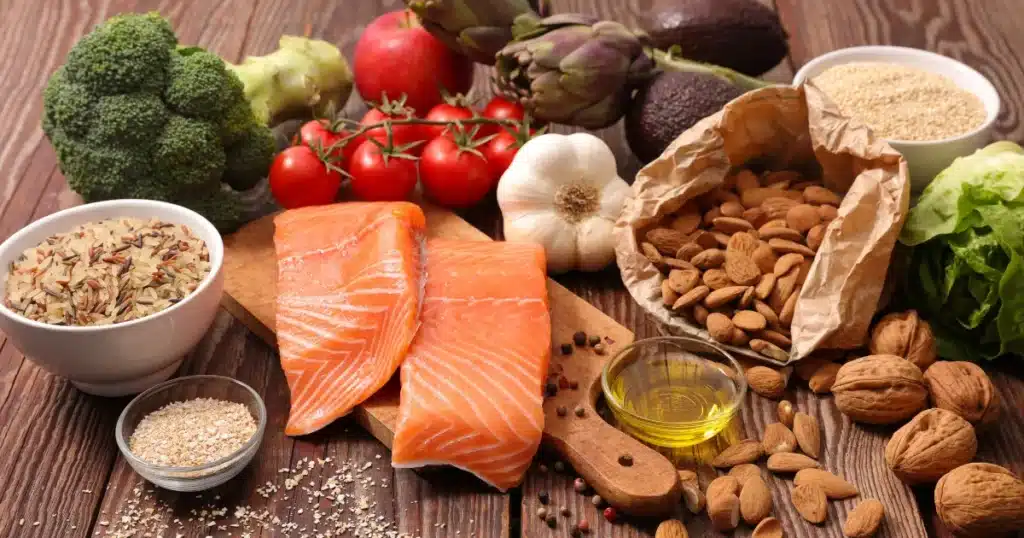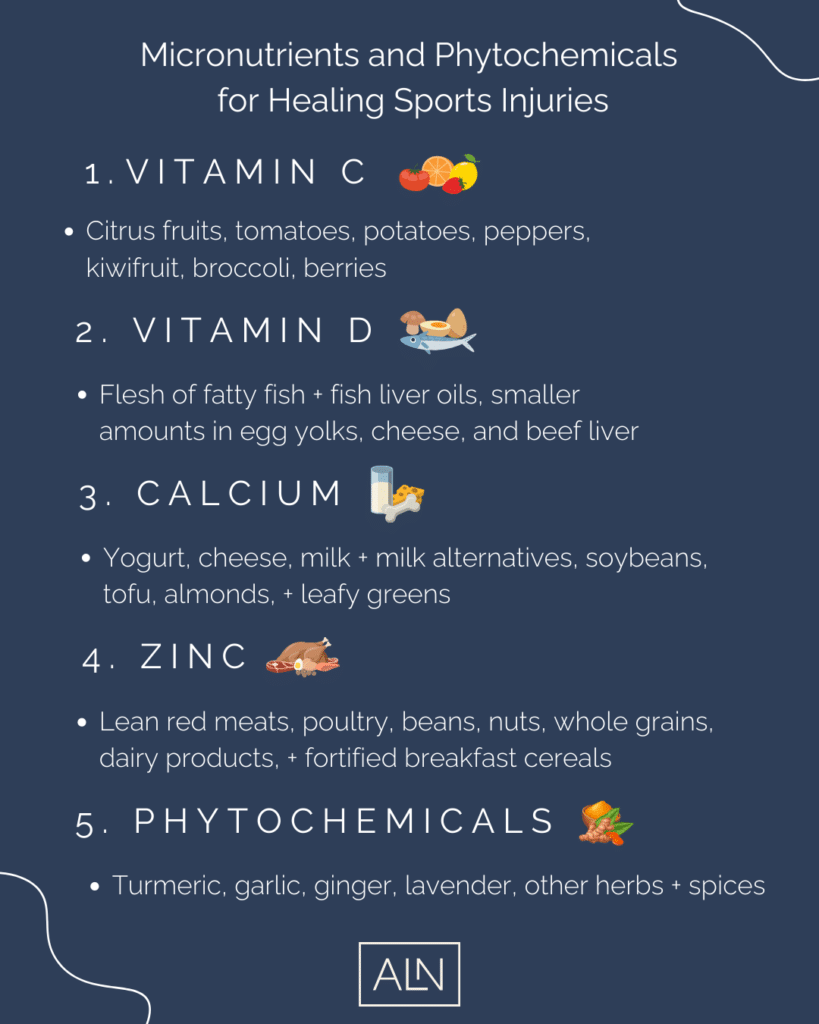Level Up Your Nutrition Game With Our Freebies
Alex
I provide nutrition coaching for endurance athletes to improve performance and body composition through a simple and flexible eating style.
Hi, I'm
ATHLETE EATING GUIDE →
LEARN MORE →
ATHLETE GROCERY SHOPPING GUIDE →
10-DAY PROTEIN-PACKED SAMPLE MEAL PLAN
READY TO FUEL?
incredible value!
The fueling guide bundle serves as your one-stop-shop for strategies to fueling before, during and after your workouts.
At some point in their athletic career, most endurance athletes suffer from an injury of varying magnitude. While being on the sidelines can take a toll on you both mentally and physically, it is important to optimize your injury recovery nutrition plan. Using our nutrition strategies below will help ease you off the bench and bouncing back to training in no time.
The Role of Nutrition in Injury Recovery

Adequate nutrition intake including calories, protein, fat, carbohydrates, and vitamins and minerals are essential for timely and complete healing of injuries. For many endurance athletes experiencing injuries, the natural inclination is to decrease calorie intake due to a dramatic decrease in activity level. Furthermore, body composition changes may also present post injury due to a marked decline in energy expenditure. If you’re feeling tempted to undercut your calorie intake in fear of gaining weight, don’t do it. This often lends itself to a slippery slope of underfueling and delaying the healing and recovery process. Getting enough nutrition can enhance healing and speed up the recovery process and is the first step in your injury recovery nutrition plan. Body composition goals may not be a primary focus if you are on the road to recovery, particularly if you are in the acute phase of an injury.
Understanding the Injury
Studies show that typically 50% of runners experience an injury each year that prevents them from running for a period of time. For even the best-intentioned endurance athlete, simply the participation in the sport is not without injury risk. There are varying magnitudes of injuries from scrapes and abrasions, to soft tissue injuries, and even fractures requiring surgical intervention. Regeneration is the natural process of replacing or restoring damaged or missing cells and tissues. Proliferation is an increase in the number of cells as a result of cell growth and cell division. In general, energy requirements are increased during the regeneration and proliferation phases of recovery.
Depending on the severity of the injury, metabolic needs vary largely and can increase your basal metabolic rate by 15-50%. The larger and more involved the injury, particularly for athletes that are post surgery, energy needs are on the higher end of this range. If you are participating in an aggressive rehabilitative program, you may have the same calories as during your training block.
Maximizing Your Injury Recovery Nutrition

To help speed up the healing process, be sure to maximize your macronutrients for optimal recovery in your injury recovery nutrition plan. Ensuring adequate intake of protein, carbohydrates and healthy fats is the next step in your injury recovery nutrition plan.
Protein
Protein is the building block for tissue repair and regeneration and is critical because it:
- Accelerates muscle growth and speeds recovery while preventing muscle breakdown
- Builds, maintains, and repairs your body’s cells
- Supports healthy immune function
- Provides all essential amino acids for function and performance
- Optimizes bone health and development
- Stabilizes blood sugar levels throughout the day
- Improves appetite control and reduces cravings
- Helps in body composition goals and weight loss maintenance
Plain and simple, be sure to prioritize protein in your injury nutrition recovery plan. While protein is always important for endurance athletes, it is especially important to help facilitate the recovery process. Depending on your injury, you may require upwards of 2.0g of protein per kilogram of body weight, which should be spaced throughout the day in regular intervals between meals and snacks. This is generally more protein intake than your in season needs. Lean protein-rich food sources to regularly include: poultry, fish, beef, eggs, Greek yogurt and cottage cheese, tofu, tempeh, seitan, edamame, legumes, and protein powder and bars. If you find yourself constantly short on meeting your protein needs, consider utilizing our high-protein breakfast, lunch, and snack guides for lots of tasty ideas.
Carbohydrates
Carbs will provide you with enough energy to heal and complete any rehabilitative sessions that you may be going through. When you consume carbohydrates, your body breaks the food into glucose (sugar) and either uses it for activity (i.e. a run or ride) or converts into glycogen to be used later. Typically, most endurance athletes in season require at least 55% of their calorie intake from carbohydrates though this is generally decreased during the injury recovery process. It is important to recognize that not all carbohydrates are the same.
Simple carbohydrates:
Simple carbohydrates are easy-to-digest. Examples include raw sugar, energy gels, sports drinks, fruit and juice, candy, and foods with added sugars. Foods that are high in simple carbohydrates are low in fiber and break down quickly to be used as energy. These foods are effective while training to provide quick bursts of energy. Most athletes that are struggling with an injury cut back on simple carbohydrates due to a decrease in exercise.
Complex carbohydrates:
These take longer to digest and are found in higher fiber, nutrient-dense foods such as whole grains, legumes, starchy vegetables such as sweet potatoes, among others. These foods are excellent to include throughout the day in meals and snacks to boost your vitamin and mineral intake and help keep you feeling satisfied, especially if you are managing a heightened endurance athlete appetite.
Healthy Fats
Healthy fats can be vital to reducing inflammation, helping with vitamin absorption, and promoting joint health. ~20-30% of your diet should be composed of healthy anti-inflammatory fat sources including olive oil, nuts and seeds, olives, avocado, and oily fish such as salmon. Flaxseed, chia seed and walnuts are extremely rich sources of omega 3 fatty acids and are beneficial to the injured athlete. Consider adding flaxseed in your morning smoothie or in a batch of no-bake protein energy bites (an athlete fave).
Micronutrients and Phytochemicals for Healing Sports Injuries

Beyond macronutrients, you also want to hone in on optimizing micronutrient intake. Be sure to focus on the following nutrients in your injury recovery nutrition plan:
Vitamin C
Vitamin C boosts collagen synthesis and promotes wound healing. Food sources include citrus fruits, tomatoes, potatoes, peppers, kiwifruit, broccoli, berries, among many others. To boost your vitamin C intake, consider adding frozen berries into your oatmeal bake or using extra tomatoes in a batch of easy vegetable spaghetti sauce.
Vitamin D
Vitamin D supports bone health and immune function. Especially for individuals who live in northern regions with less sun exposure, it is extremely difficult to receive enough vitamin D in the diet. Furthermore, few foods are rich in vitamin D3. Vitamin D is extremely important for maintaining healthy bones and also is important for anti-inflammatory and antioxidant properties. The best food sources are the flesh of fatty fish and fish liver oils and smaller amounts in egg yolks, cheese, and beef liver. Supplementing with vitamin D3 can help most individuals maintain normal vitamin D levels.
Calcium
Calcium also supports the bone remodeling and mineralization phases if you are experiencing a bone-related injury. Adults should aim for between 1,000-1,200mg of calcium each day through food sources such as yogurt, cheese, milk and plant-based milk alternatives, soybeans, tofu, almonds, and leafy greens. Reference the delightful cheesecake smoothie recipe below for an extra boost in protein, calcium and other health-promoting nutrients.
Zinc
Zinc aids in tissue repair and enhances the immune system. It can be found in foods such as lean red meats, poultry, beans, nuts, whole grains, dairy products, and fortified breakfast cereals.
Phytonutrients and phyto-chemicals
Phyto-chemicals contain antioxidant and wound-healing properties. One of the most extensively studied phyto-chemicals is curcumin, which is a chemical compound present in turmeric and can help facilitate the recovery process. Though other herbs and spices including garlic, ginger, lavender, among many others are advantageous for redeemable health properties. In your meal prepping routine, experiment adding flavor to your cooking with new herbs and spices.

Supplements for Injury Recovery

My team and I encourage a flexible style and “foods first” approach to nutrition, including in your injury recovery nutrition plan. Though at times, it may be difficult to meet your micronutrient needs day in and day out. If this is the case, it may be advantageous to supplement with a high-quality multivitamin, at minimum. Though be sure to reference our guide on other advantageous nutrition supplements for endurance athletes.
Get the Scoop on Collagen for Soft-Tissue Injury Recovery
Collagen is the most abundant protein in the human body and is important for bone health and making connective tissue. The production of collagen decreases with the aging process though can also be obtained from food sources including bone broth, lean meats and poultry, eggs, and fish. If you are starting the rehabilitative process, preliminary research shows that supplementing with 5-15g of collagen at least 1 hour prior to exercise may reduce functional joint pain and improve muscle recovery. In addition, it may increase pain-free time to exertion and collagen synthesis.
Collagen is best absorbed with vitamin C-rich food sources. Consider mixing a scoop of collagen powder with orange juice prior to your rehab session. Collagen is derived from animal bone and cartilage, so for athletes looking for plant-based collagen product you’ll see a variety of collagen-promoting products but they will need to be researched further to determine efficacy for athletes.
Choosing Quality Supplements
We highly recommend choosing nutrition supplements that are third-party tested. Look for NSF Certified for Sport or Informed Choice for Sport when choosing a product. A supplement brand that I love and trust is Thorne Research. They offer a collagen product (flavored and unflavored), high-quality protein powders and vitamin and mineral supplements! You can use this link to get 15% off your order (discount applies at checkout).
It’s best practice to discuss any specific supplementation routine with your primary care provider for more specific dosage guidelines.
Creating a Personalized Injury Recovery Nutrition Plan
If you find yourself unwillingly on the sidelines for the foreseeable future, be sure to reach out. My team and I are here to support you. This can actually be a great time to create a solid foundation with your day-to-day nutrition, while incorporating an injury recovery nutrition plan. That way you’ll bounce back from your injury faster and return to feeling fit and strong with quality nutrition and eating habits to support you.
Alex
I provide nutrition coaching for endurance athletes to improve performance and body composition through a simple and flexible eating style.
Hi, I'm
LEARN MORE →
take the quiz!
Let's discover your Endurance Nutrition IQ
How well do you know your fueling? Answer these questions and let's see where your endurance nutrition knowledge is at!
Take the quiz
level up your nutrition game with these freebies
free downloadS
Protein-Packed 10-Day Sample Meal Plan
Athlete Eating Guide
Athlete Grocery Shopping Guide
1
2
3
Inspiration to fit 120 grams of protein into your day
Planning what goes on your plate
Putting the right foods in your grocery cart
